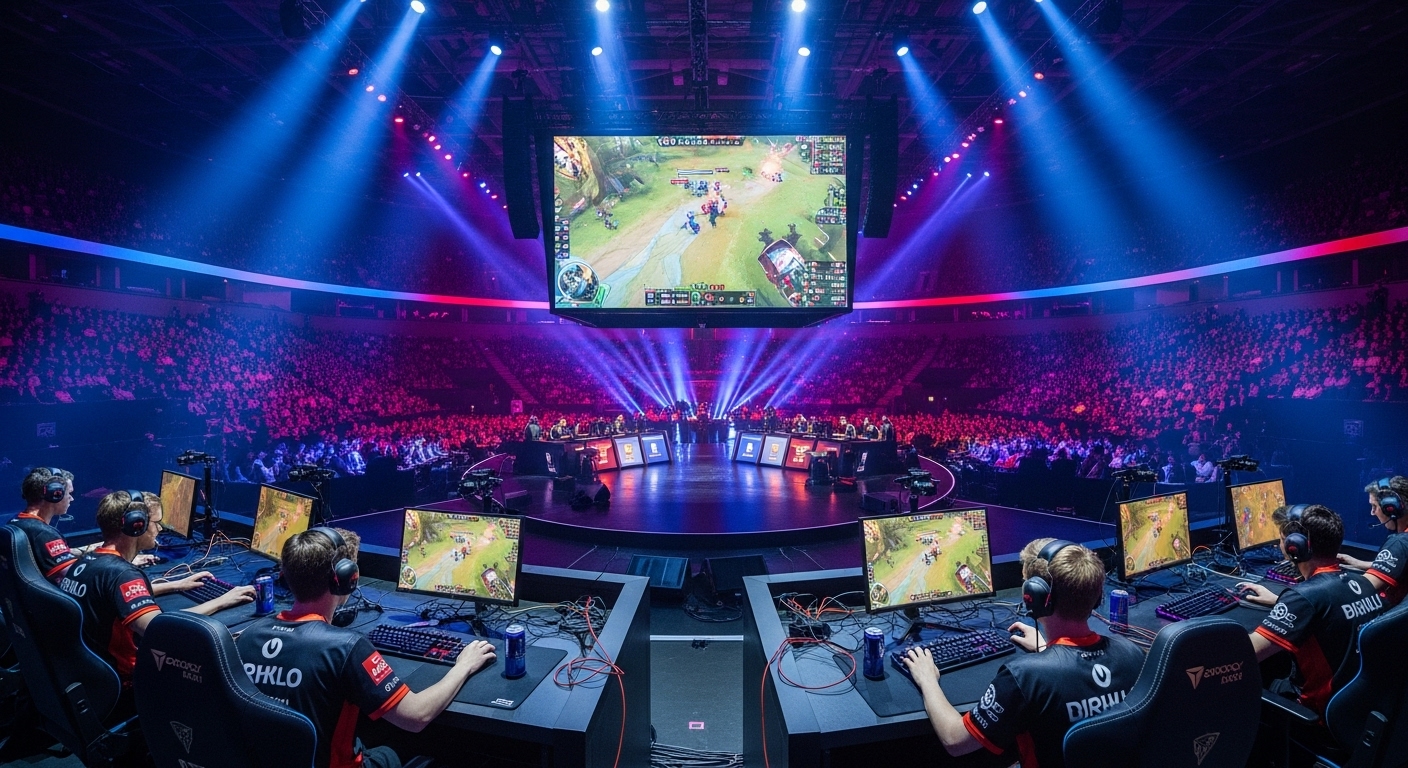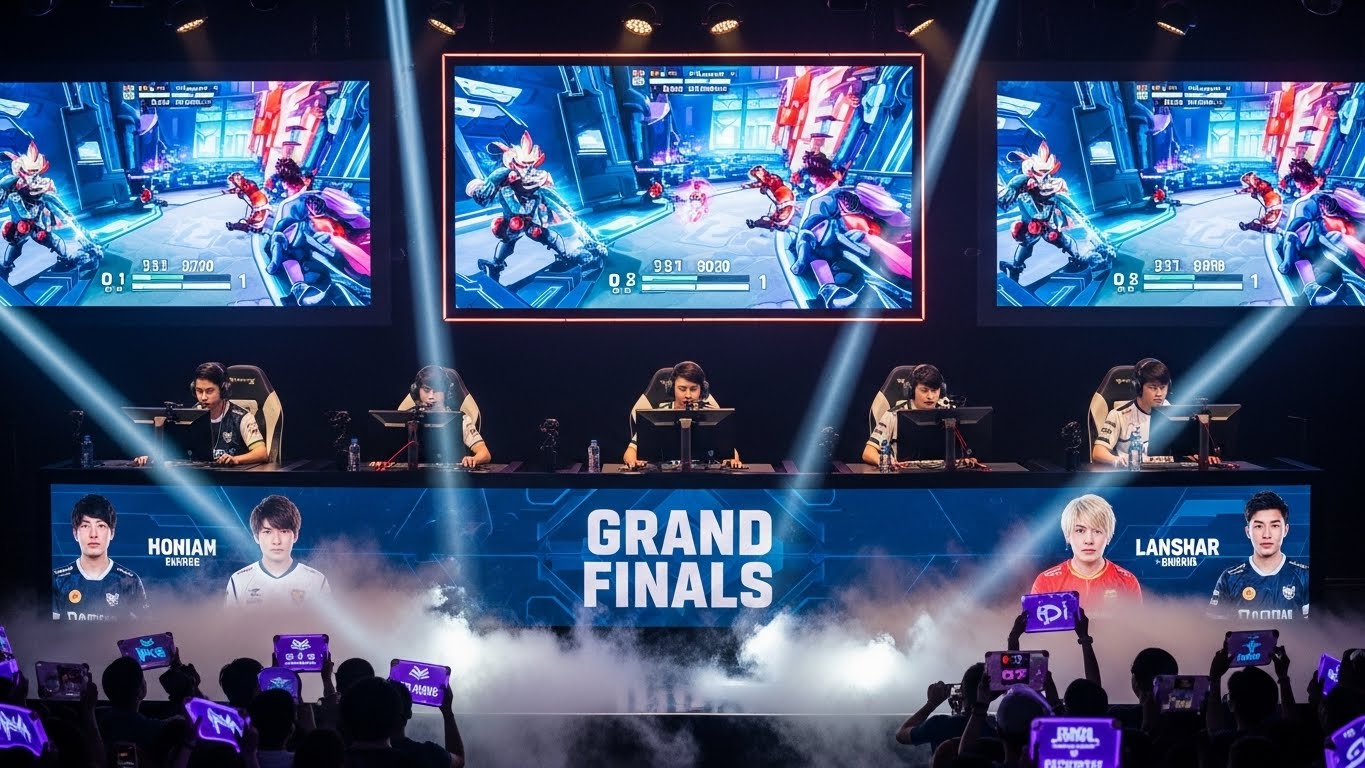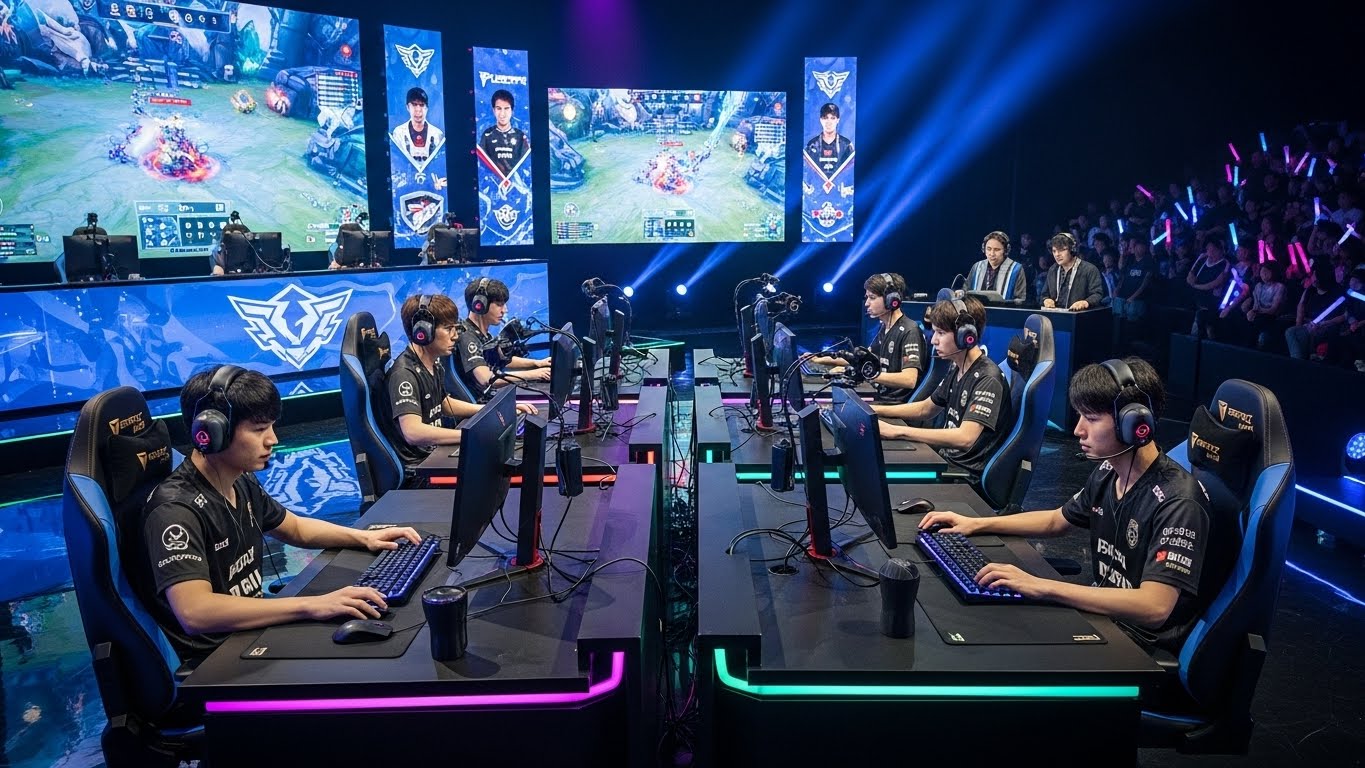Introduction to Esports
Esports, short for electronic sports, refers to organized competitive video gaming where individuals or teams compete in various game titles for prestige, recognition, and often substantial prize money. Once regarded as a casual pastime, gaming has evolved into a global phenomenon that mirrors traditional sports in scale, structure, and fan engagement. Over the past two decades, esports has grown from small local tournaments to multi-million-dollar international events filling massive arenas and watched by millions worldwide. This growth has not only transformed gaming culture but also the entertainment industry as a whole.
The Origins of Competitive Gaming
The concept of competitive gaming is not new. The earliest recorded video game competition took place in 1972 at Stanford University, where students played a game called Spacewar. The winner received a one-year subscription to a magazine. Although simple by modern standards, this event symbolized the birth of competitive gaming culture. In the 1980s, arcade gaming brought competition to the public, with players striving to top the leaderboards in games like Pac-Man and Donkey Kong. However, it was not until the late 1990s and early 2000s, with the rise of the internet and online multiplayer games, that esports truly began to take shape.
The Early Days of Online Competition
The rise of broadband internet changed gaming forever. Titles such as StarCraft, Counter-Strike, and Quake popularized online multiplayer modes, allowing players from across the world to compete against each other. South Korea emerged as the early leader in this new digital sport. Government support for broadband infrastructure and a culture that embraced gaming led to the establishment of professional leagues and televised matches. Korean players became icons, and games like StarCraft achieved celebrity status. Esports was no longer a niche hobby; it was becoming a legitimate profession.
The Global Expansion of Esports
As technology advanced and gaming platforms became more powerful, esports spread rapidly across the globe. North America, Europe, and China began developing their own professional teams, leagues, and tournaments. The release of iconic titles such as Dota 2, League of Legends, and Call of Duty helped propel esports into the mainstream. Global tournaments like The International and the League of Legends World Championship began offering multi-million-dollar prize pools, attracting sponsorships from major brands and creating career paths for professional players, coaches, and commentators.
The Esports Ecosystem
The esports industry is a complex ecosystem composed of various elements working together. At its core are the players, who dedicate countless hours to mastering their craft. Surrounding them are the teams, which function like traditional sports organizations, complete with managers, analysts, and trainers. Leagues and tournament organizers host the events, while broadcasters and streaming platforms distribute content to global audiences. Sponsors, advertisers, and investors provide financial support, recognizing the immense potential of this fast-growing market. This ecosystem also includes fans, content creators, and game developers who contribute to the cultural fabric of esports.
Popular Esports Titles
Different genres of games dominate the esports scene, each with its own dedicated fan base and competitive structure. Multiplayer Online Battle Arena (MOBA) games such as League of Legends and Dota 2 require teamwork, strategy, and mechanical precision. First-Person Shooter (FPS) games like Counter-Strike and Overwatch test reflexes, coordination, and tactical awareness. Real-Time Strategy (RTS) games, including StarCraft II, demand quick decision-making and resource management. Fighting games like Street Fighter and Super Smash Bros. highlight individual skill and timing. Sports simulation games such as FIFA and NBA 2K attract fans of traditional sports who enjoy the digital version of their favorite games.
The Role of Streaming Platforms
The rise of streaming platforms like Twitch and YouTube Gaming played a crucial role in the growth of esports. These platforms allowed players to showcase their skills live to millions of viewers. Streamers and professional gamers became internet celebrities, building loyal fan communities and influencing gaming culture. Live streaming also gave fans a chance to interact with players in real time, creating a sense of closeness and engagement that traditional sports often lack. Additionally, streaming revenue, donations, and sponsorships provided new income sources for players and teams, further professionalizing the industry.
Esports and Traditional Sports
Initially, traditional sports organizations were skeptical of esports. Many considered video gaming a hobby rather than a legitimate form of competition. However, as esports audiences grew, major sports franchises began investing in the industry. Professional football, basketball, and baseball teams established their own esports divisions. The similarities between esports and traditional sports are undeniable—both require teamwork, strategy, dedication, and fan loyalty. The main difference lies in the medium: one takes place on a physical field, while the other unfolds on a digital battlefield. The crossover between the two has blurred lines, leading to collaborations, joint events, and mutual respect between athletes and gamers.
The Economics of Esports
The financial growth of esports has been extraordinary. Prize pools for major tournaments now rival or exceed those of traditional sports. For instance, events like The International in Dota 2 have distributed tens of millions of dollars in prizes, funded largely through community contributions. Sponsorships, merchandise sales, ticketing, and advertising generate massive revenue streams. Esports organizations function like businesses, complete with branding, marketing, and talent management divisions. The global esports market is projected to continue growing as more brands, investors, and audiences recognize its profitability and cultural significance.
The Lifestyle of Professional Gamers
Becoming a professional gamer is not as easy as it might appear. Players undergo intense training schedules, often practicing for 10 to 12 hours a day. They study game mechanics, analyze opponents, and participate in scrimmages. Mental and physical health are crucial; players must maintain focus, reflexes, and teamwork under high pressure. Many teams now employ psychologists, nutritionists, and physical trainers to ensure their players perform at peak condition. Despite the glamorous image of fame and wealth, the career span of a professional gamer is relatively short, usually ending in their late twenties due to burnout and the fast-paced evolution of the gaming landscape.
The Importance of Teamwork and Strategy
Just like traditional sports, teamwork is at the heart of esports success. Whether in a MOBA or a first-person shooter, coordination and communication among team members can make the difference between victory and defeat. Teams spend hours developing strategies, reviewing past matches, and adapting to opponents’ playstyles. Coaches and analysts play a significant role in this process, helping players refine tactics and stay mentally prepared. The ability to think quickly, adapt to changing situations, and maintain composure under pressure defines elite-level players and teams.
Esports Arenas and Live Events
The experience of attending a live esports event is unlike any other. Massive arenas filled with fans cheering for their favorite teams create an electrifying atmosphere. High-quality production, light shows, music, and live commentary make these events feel like concerts and sports matches combined. Countries like South Korea, China, and the United States have built dedicated esports stadiums designed for both live audiences and digital broadcasting. These venues symbolize the legitimacy and cultural importance of esports in the modern entertainment landscape.
Esports and Education
Esports is increasingly being recognized in the field of education. Universities and colleges around the world now offer scholarships for skilled gamers, similar to those in traditional athletics. Educational programs teach game design, esports management, and marketing, preparing students for careers in this expanding industry. Schools use esports to engage students in technology, teamwork, and strategic thinking, encouraging both academic and social development. The integration of esports into education demonstrates how gaming has evolved beyond recreation to become an influential component of modern learning.
The Role of Women in Esports
While the esports scene has been historically male-dominated, women have made significant strides in recent years. Female gamers, commentators, and team managers are challenging stereotypes and breaking barriers. All-female teams and women-led tournaments are becoming more visible, empowering a new generation of gamers to pursue their passion without fear of bias or discrimination. The inclusion of women in esports not only enriches the community but also broadens its appeal to global audiences, fostering diversity and equality in digital competition.
The Cultural Impact of Esports
Esports has transcended gaming to become a cultural movement. It influences music, fashion, entertainment, and even language. Gaming merchandise, esports-inspired apparel, and pop-culture collaborations have turned players into icons. Esports athletes appear on magazine covers, star in documentaries, and participate in mainstream events. The community-driven nature of esports also promotes inclusivity, creativity, and global connection. Fans from different countries unite under shared passions, creating a worldwide digital culture that celebrates skill, dedication, and teamwork.
Challenges Facing the Esports Industry
Despite its tremendous success, esports faces several challenges. Issues such as player burnout, lack of regulation, and inconsistent tournament structures can hinder growth. Cheating, match-fixing, and toxicity within online communities are ongoing concerns. Additionally, balancing commercialization with community values remains difficult as corporations enter the space. Mental health support and fair treatment of players are becoming increasingly important topics. Addressing these challenges is crucial for ensuring a sustainable and ethical future for the industry.
The Future of Esports
The future of esports looks incredibly bright. Advances in technology, including virtual reality and artificial intelligence, will likely reshape how games are played and experienced. Mobile esports are expanding accessibility, especially in regions with limited access to high-end gaming PCs. The inclusion of esports in major global events like the Asian Games and discussions about its potential inclusion in the Olympics indicate growing institutional recognition. As gaming becomes more integrated with mainstream entertainment, esports will continue to redefine how we perceive competition, community, and digital innovation.
The Global Community of Esports
One of the most remarkable aspects of esports is its global community. Gamers from different backgrounds, languages, and cultures come together in virtual arenas. The sense of unity that esports fosters transcends geographical boundaries. Online communities discuss strategies, share highlights, and celebrate victories together. Fans invest emotionally in teams and players, forming identities around their favorite games. This global connection has made esports one of the most inclusive and connected movements of the 21st century.
The Integration of Technology and Innovation
Technology drives the evolution of esports. From high-refresh-rate monitors to cloud gaming and advanced streaming software, every innovation enhances the competitive experience. Developers continually update games to ensure balanced and fair competition. Artificial intelligence tools help analyze gameplay, while data analytics refine strategies and scouting methods. Virtual reality and augmented reality hold potential for immersive spectator experiences, making esports not just a form of competition but an evolving technological frontier.
Esports and Youth Empowerment
For younger generations, esports represents opportunity. Many young people who once viewed gaming as a hobby now see it as a career path. Esports encourages creativity, problem-solving, and teamwork. It has also become a platform for self-expression and identity building. Through competitive gaming, young people learn discipline, communication, and leadership—skills that extend beyond the screen. Moreover, esports offers an alternative to traditional sports for those who may not be physically inclined but still thrive in a competitive environment.
Conclusion: The Legacy of Esports
Esports is more than a trend—it is a revolution in entertainment, culture, and technology. From humble beginnings in arcades and university basements to packed arenas and global championships, esports has proven its legitimacy and influence. It unites millions under a shared passion for gaming, showcasing the power of digital connection and human ingenuity. As the industry continues to expand, it will shape the future of how we play, watch, and experience competition. The story of esports is still being written, but one thing is certain—it has permanently changed the world of sports and entertainment forever.



